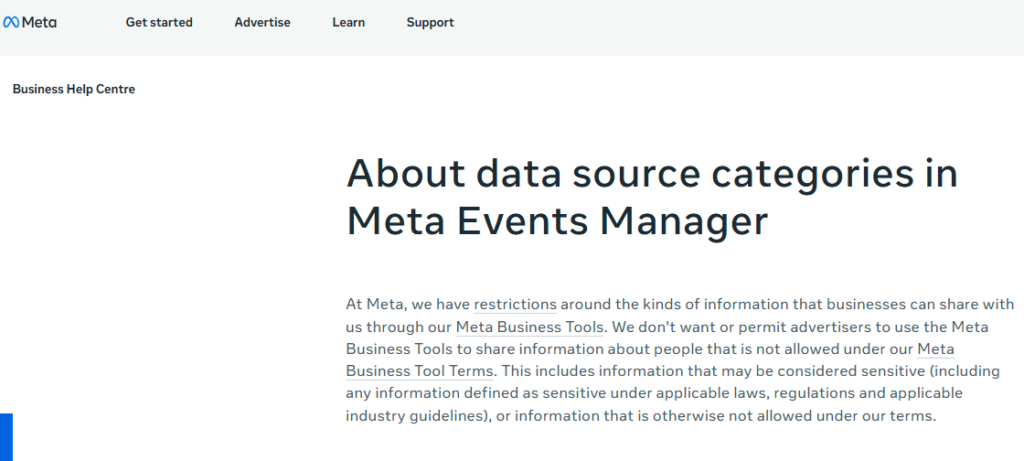Starting in January 2025, Meta will enforce new restrictions on lower-funnel conversion tracking, significantly impacting health and wellness businesses that rely on performance marketing to drive sales. Brands selling products like supplements, fitness equipment, or medical devices, as well as subscription services such as fitness apps or meal plans, will be most affected.
Despite the announcement being made in mid-November 2024, many businesses remain unaware of the upcoming changes and are likely unprepared to adapt their strategies. Small-to-medium enterprises and those running seasonal campaigns will face particular challenges in optimising and measuring the success of their campaigns due to limitations on tracking and data sharing through Meta’s tools. Here’s what these changes mean and how to adapt effectively.
What’s Changing: Meta’s Crackdown on Data Sharing
Meta is intensifying its policies around how sensitive consumer data is shared, particularly for health and wellness brands. While these policies aren’t entirely new, stricter enforcement will impact advertisers’ ability to use lower-funnel conversion data—an essential component of performance marketing strategies.
Key Implications Include:
- Data Limitations: Affected brands may lose access to tracking capabilities through Meta’s pixel or API, hindering their ability to measure conversions effectively.
- Varied Impact: Some brands may face complete restrictions, while others might retain limited access, such as using certain tools like purchase pixels but with reduced functionality.
- Uncertainty Around Appeals: While Meta offers an appeals process, the details remain unclear, complicating advertisers’ planning efforts.
Who’s in the Hot Seat? Businesses Most at Risk
Certain types of businesses and campaigns will feel the sting of these policy changes more acutely:
- Performance-Focused Health and Wellness Brands:
Brands heavily reliant on Meta for driving direct sales—like those selling fitness equipment, supplements, dietary products, or medical devices—will feel the greatest impact. These businesses typically depend on lower-funnel tools to optimise campaigns in real time.For example, a supplement brand running “Buy 1 Get 1 Free” ads during the New Year’s resolution season will struggle to track how many users clicked the ad, added products to their cart, and completed the purchase. - Subscription-Based Models:
Health and wellness brands offering subscription services—like meal kits, fitness apps, or ongoing wellness consultations—use conversion tracking to optimise customer acquisition. Losing access to lower-funnel metrics will make it harder to refine these campaigns effectively.A fitness app promoting a free trial offer might lose the ability to retarget users who show interest but don’t complete the sign-up process. - Small and Medium-Sized Businesses:
Smaller brands lacking sophisticated analytics systems or the budget to diversify ad spending will likely struggle more than larger competitors. Many of these businesses rely on Meta as their primary advertising platform. - Peak Season Campaigns Under Pressure:
Campaigns capitalising on seasonal trends, such as “New Year, New Me,” will face disruption. Health and wellness businesses often allocate large budgets during peak seasons, relying on Meta’s tools to maximise ROI. Without effective tracking, these campaigns could underperform.
Why Now? The Bigger Picture Behind Meta’s Move
Meta’s changes are part of a broader trend driven by increasing privacy regulations, such as Washington State’s My Health My Data law. These rules aim to protect consumer privacy by restricting how sensitive data is shared and used in advertising. Over time, similar measures are likely to expand to other platforms.
However, the timing of this announcement, just two months before enforcement, has left many businesses scrambling to understand the implications. If brands don’t adapt quickly, they risk severe disruptions during crucial sales periods.
How to Pivot: Strategies to Stay Ahead
Facing these challenges, health and wellness brands must rethink their advertising approaches. Here’s how to adapt:
- Shift Focus to Brand Awareness:
Move beyond conversion-driven campaigns and invest in upper-funnel strategies. These campaigns build brand recognition and trust without relying heavily on granular tracking data. - Embrace Incrementality Testing:
Use geo-experiments and media mix modelling (MMM) to measure your campaigns’ broader impact. These techniques provide insights into overall sales lift, even without detailed conversion data from Meta. - Explore New Advertising Channels:
Diversify your ad spend across platforms like Google, TikTok, and Applovin’. Consider influencer partnerships to maintain audience engagement while reducing reliance on Meta. - Adopt Privacy-Friendly Attribution Models:
Tools relying on aggregated and anonymised data, such as probabilistic attribution models, can help you navigate the loss of deterministic tracking.
Online Privacy Shifts Will Probably Continue
While these changes may feel disruptive now, they signal a shift toward a more privacy-centric advertising landscape. Stricter data-sharing rules encourage innovation and help protect consumer privacy, ultimately fostering greater trust between brands and audiences.
Preparation is key to thriving in this evolving environment. To stay ahead:
- Evaluate how much your business relies on Meta’s lower-funnel tools and identify gaps.
- Test new platforms and measurement strategies to diversify your digital marketing mix.
- Collaborate with agencies to build resilient, privacy-first campaigns.
- Stay up to date with Meta’s policy updates and privacy regulations.
By embracing these changes, health and wellness brands can turn challenges into opportunities, building a foundation for long-term success in a privacy-first digital world.




RECOMMENDED FOR YOU
Google Ads Redesign
Google is making notable changes to how ads appear…
Google is making notable changes to how ads appear…
Meta Expands WhatsApp Ads With Status Click-To-Chat
Meta has taken a significant step in turning WhatsApp…
Meta has taken a significant step in turning WhatsApp…
Google Analytics Integrates Meta Data
Google Analytics has rolled out a new update that…
Google Analytics has rolled out a new update that…